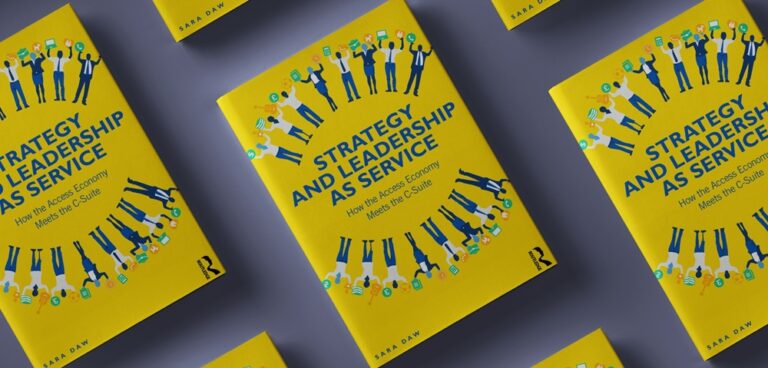
Fractional leaders are transforming business growth by providing flexible leadership support at a fraction of the cost of full-time executives. Sara Daw, Group CEO of The CFO Centre and The Liberti Group, is a leading expert in this field. Currently pursuing a PhD in fractional leadership, she has also published research on the subject in her book Strategy and Leadership as Service. In this article, she delves into the rising trend.
For many organisations looking to scale up, fast growth is the Holy Grail. There are many reasons for this; rapid growth can help a business capture a larger share of the market, making it more competitive and influential. It can increase sales and consequentially profits, while enabling organisations to benefit from economies of scale as the business grows. Fast-growing companies attract top talent and are extremely appealing to investors. And, finally, diversifying products and markets through growth can help a business spread risk and become more resilient to market fluctuations.
The problem is that any growth, let alone fast growth, is not guaranteed; according to a report by McKinsey, about a quarter of companies don’t grow at all, and between 2010 and 2019, only one in eight achieved more than 10 percent revenue growth annually. In order to achieve fast growth, you need an executive team that includes top talent with a growth mindset – growth leaders across the C-suite are 70 percent more likely than peers to have growth as their top priority, according to the McKinsey report.
However, although start-ups and SMEs may realise that they need an experienced, growth-focused C-suite in place in order to scale up, this can seem like an impossible dream. A full-time C-suite usually comes with a hefty price tag – and it’s not without risk, because hiring the wrong talent can be a very costly and time-consuming mistake to make. According to a study by economist Eileen Appelbaum and sociologist Ruth Milkman, the cost of a bad hire at this level can be as high as 213% of the employee’s salary. For many smaller organisations, in particular, this may put the possibility of hiring the talent they need for fast growth out of reach.
But there is a solution. Fractional leadership is reshaping the future of work, challenging the traditional full-time employment paradigm by offering businesses access to top-tier expertise without the full-time commitment – and, of course, the expense involved with this. By shifting roles from the “payroll” to an “access-role,” companies tap into the functional, emotional, and collective intelligence needed for growth.
Typically, these high-calibre fractional professionals, with extensive knowledge and experience across finance, marketing, HR, technology, and more, have left the corporate world for greater flexibility, variety, and control. Now self-employed, they work with a portfolio of growing businesses or larger organisations on a flexible, part-time basis—perhaps one day a week, two days a month, or whatever the business needs.
For start-ups and SMEs, employing a fractional C-suite – whether that’s a full C-suite or just to fill existing skills gaps – can make all the difference between incremental growth and making it big. These leaders have been there, seen it, and done it when it comes to their function. They know what it is like to feel ‘big’ and how to get there. They’ve got the networking skills and contacts that can open the necessary doors for the organisation – and they are more than just employees, they are mentors. It can be lonely and stressful for entrepreneurs, with the whole responsibility for growing the business resting on their shoulders. The fractional leadership team is there to support and advise, allowing entrepreneurs to focus on other core areas of the business while also helping equip them with the confidence and skills they need to take their business forward.
Indeed, that’s another benefit of hiring a fractional executive team – should the founder decide to take back the reins of the business, they can. These parameters can be built into the contract with the fractional team right from the start, giving start-ups and SMEs confidence that they have control over their own organisations. Founders and entrepreneurs can learn from top talent, then take the business forward themselves – and many companies have done this extremely successfully.
Equally, for larger corporations and Group CxOs who are overwhelmed with an extensive list of responsibilities, fractional leaders offer an effective solution in the form of seasoned professionals who can seamlessly fill gaps and complete tasks without requiring oversight. Beyond execution, their diverse career backgrounds enable them to assist the existing C-suite in making critical strategic decisions that can significantly impact performance.
The true advantage of fractional support for full-time CxOs lies in their ability to perform with minimal supervision. They bring the necessary skills, knowledge, and reliable support, handling tasks you lack the time or resources to address. This ensures that essential activities are managed efficiently, even when internal capacity is limited – and they are non-threatening, offering support without the fear they may be after your job! That is the last thing fractional executives are looking for, having chosen to exit the full-time executive world for their own good reasons. Their commitment is simply to deliver for their clients.
So, how do you ensure you get maximum benefit from your fractional C-suite team? The key here is investing in the relationship. Like all good relationships, you get out what you put into it, and the more closely aligned you are in terms of communication, priorities and goals, the more favourable the outcome. As the saying goes – teamwork makes the dream work! Unsurprisingly, given all the above, analysis shows that the number of temporary business management positions, including fractional C-suite roles, has increased by 57% since 2020 – a trend that reflects the growing recognition of the value that fractional leaders bring to organisations, offering high-level expertise and flexibility without the long-term commitment of full-time hires. If you want all the benefits of fast growth – and who doesn’t – then you need the right, growth-orientated talent in place, and a fractional C-suite is the most competitive and cost-effective way of doing this. It’s a trend no business can afford to ignore.



